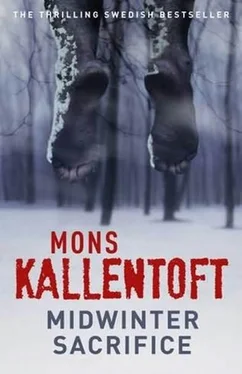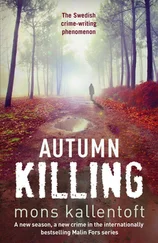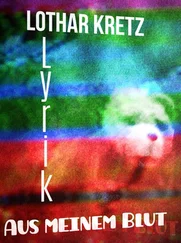There is a deceptive emptiness, a trickling poison in the meeting room. Because all five of the officers assembled know that when that question is left hanging in the air, it can influence and change an entire community, a region, a country, a whole world.
The room is on the ground floor in one of the old military barracks in the A1-district that was rebuilt as the central police station about ten years ago when the regiment was disbanded: military out, law and order in.
Outside the barred windows is a ten-metre-wide, snow-covered lawn, then a playground, empty and desolate; the swings and climbing-frames are painted in primary colours but the white frost has turned them all into a collage of grey. Beyond the park, inside the nursery school’s large windows, Malin can see children playing, running to and fro, doing all the things that make up their world.
Tove.
It’s been a long time since you ran about like that.
Malin called her from the car, and Tove answered on her way out of the flat: ‘Of course I got up.’
‘Wrap up warm.’
‘What, do you think I’m stupid or something?’
Zeke: ‘Teenagers. They’re like horses on a racecourse. They never do what you want.’
Sometimes when they’ve been working on particularly violent cases, with pictures pinned up on the walls of the meeting room, they close the blinds to shield the children in the nursery, so that they don’t see the sort of thing they probably see on television every day, flickering past on an unguarded set, image added to image, as the child learns to trust its own eyes.
A slit throat. A burned corpse hanging from a lamppost, a swollen body in a flooded town.
And now Sjöman’s words, the same words as always, his gruff voice: ‘So, what do you think we’ve got here? Any ideas, anyone? There have been no new missing person reports, and if that was going to happen it would probably have happened by now. So what do we think?’ A question tossed into the room by a standing man to people sitting round an oblong table, his finger pressing the play button, words like music, like notes, hard and brittle between the four walls.
Johan Jakobsson speaks up, and it is obvious he has been waiting to hear his own voice, that he has been wanting to say something, anything, if only to put an end to his own tiredness.
‘It’s got ritual written all over it.’
‘We don’t even know for sure that he was murdered,’ Sven Sjöman says. ‘We can’t be sure until Karin Johannison is finished. But we can presume that he was murdered. That much is clear.’
You don’t know anything for certain, Malin. Until you know. Until then: the virtue of ignorance.
‘It looks like a ritual.’
‘We have to keep an open mind.’
‘We don’t know who he is,’ Zeke says. ‘That would be a good start, finding out who he is.’
‘Maybe someone will call in. The pictures are in the paper already,’ Johan says, and Börje Svärd, who has been silent up to now, sighs.
‘Those pictures? You can’t see the face.’
‘How many people that overweight can there be round here? And before too long someone will wonder where that fat man has disappeared to.’
‘Don’t be so sure,’ Malin says. ‘This city’s full of people that no one would notice if they went missing.’
‘But he looks different, his body-’
‘If we’re lucky,’ Sven interrupts Johan, ‘someone will call in. To begin with we’ll have to wait for the results of the search of the scene and for the post-mortem. We can start knocking on doors in the area, find out if anyone saw or heard anything, if anyone knows anything we ought to know. We have, as you’re well aware, one question that has to be answered.’
Sven Sjöman, Malin thinks. Four years left before he reaches sixty-five, four years left at risk of a heart attack, four years of overtime, four years of his wife’s tasty and lovingly prepared but dangerously fatty food. Four years of too little exercise. A widow-making stomach . But Sven is still the voice of reason in the room, the voice of experience, pushing no particular angle, stressing sensible, disinterested, mature methodology.
‘Malin, you and Zeke will be in charge of the preliminary investigation,’ Sven says. ‘I’ll see that you get the resources you need for the foot-work. And you two can help them as much as you have time for.’
‘I’d have been happy to take this on,’ Johan says.
‘Johan, we’ve got other things to do as well,’ Börje says. ‘We don’t have the luxury of concentrating on just one case.’
‘Is the meeting over?’ Zeke asks, pushing back his chair and standing up.
The moment they have all got to their feet the door opens.
‘You can all sit down again.’
Karim Akbar says these words with all the gravity his muscular, thirty-seven-year-old body can muster, then goes to stand beside Sven Sjöman and waits while the other four officers sink into their chairs again.
‘You appreciate how important it is,’ Karim says, and it strikes Malin that there isn’t a trace of an accent in his speech, despite the fact that he was already ten years old when he arrived in Sweden. He speaks clear, empty, standard Swedish.
‘How important it is,’ he repeats, ‘that we get this sorted out,’ and it sounds just like he’s talking about a dissertation that needs restructuring before a viva.
Hard work and application.
If you start on minus and want to get to double-plus, you can’t afford to leave anything to chance. Karim has written controversial opinion pieces in Svenska Dagbladet and Dagens Nyheter , perfectly chiselled to match the needs of the age. His opinions have upset a lot of people: immigrants must meet certain requirements; benefits need to be linked to linguistic ability in Swedish after just one year in the country. Exclusion can only become inclusion with a lot of effort.
His face appears regularly on television discussion programmes. Make demands, liberate people’s innate potential. Look at me, it can be done. I am living proof.
But what about the timid? Malin wonders. Those who were born diffident?
‘We know this is what our job is about. Solving crimes like this,’ Zeke says, and Malin sees Johan and Börje smiling furtively as Sven pulls a face that means: Calm down, Zeke, let him make his speech; just because you don’t make a fuss doesn’t mean that you’re nothing but a manual labourer for him. For God’s sake, haven’t you grown up, Martinsson?
Karim gives Zeke a look that says: Show me respect, and don’t use that tone, but Zeke doesn’t look away. So Karim goes on instead: ‘The press, the media, will make a big deal out of this, and I’m going to have to answer a lot of questions. We have to come up with the solution quickly; it’s a matter of showing how efficient the Linköping Police are.’
Malin thinks that it sounds like Karim’s words are being spoken by an automaton. No one talks like that in real life, and the competent individual in front of her is playing the role of a competent individual, when he would really prefer to relax and show… well, what?… his vulnerable side?
Then Karim turns to Sven. ‘Have you allocated resources?’
‘Fors and Martinsson are in overall charge. They have all necessary resources at their disposal. Jakobsson and Svärd will assist as much as they can. Andersson is off sick and Degerstad is still on her course in Stockholm. That’s the situation right now.’
Karim takes a deep breath, holding the air in his lungs for a long time before breathing out.
‘Okay, this is what we’re going to do. Sven, as usual you will have overall responsibility as primary investigator, and you other four can form a team. Everything else will have to wait. This has the very highest priority.’
Читать дальше












